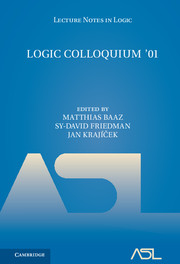Book contents
- Frontmatter
- Preface
- Contents
- TUTORIALS
- ARTICLES
- Modified bar recursion and classical dependent choice
- Choice and uniformity in weak applicative theories
- Compactness and incompactness phenomena in set theory
- Selection for Borel relations
- Interpolation in goal-directed proof systems 1
- Sequences of degrees associated with models of arithmetic
- The limit theory of generic polynomials
- Moschovakis's notion of meaning as applied to linguistics
- Tameness in expansions of the real field
- The model theory of compact complex spaces
- “Natural” representations and extensions of Gödel's second theorem 350
- Effective Hausdorff dimension
- Mutual stationarity in the coremodel
- The pair (Nn, N0) may fail N0-compactness
- Incompleteness theoremand its frontier
- Groups in Simple Theories
- References
Choice and uniformity in weak applicative theories
from ARTICLES
Published online by Cambridge University Press: 31 March 2017
- Frontmatter
- Preface
- Contents
- TUTORIALS
- ARTICLES
- Modified bar recursion and classical dependent choice
- Choice and uniformity in weak applicative theories
- Compactness and incompactness phenomena in set theory
- Selection for Borel relations
- Interpolation in goal-directed proof systems 1
- Sequences of degrees associated with models of arithmetic
- The limit theory of generic polynomials
- Moschovakis's notion of meaning as applied to linguistics
- Tameness in expansions of the real field
- The model theory of compact complex spaces
- “Natural” representations and extensions of Gödel's second theorem 350
- Effective Hausdorff dimension
- Mutual stationarity in the coremodel
- The pair (Nn, N0) may fail N0-compactness
- Incompleteness theoremand its frontier
- Groups in Simple Theories
- References
Summary
Abstract. We are concerned with first order theories of operations, based on combinatory logic and extended with the type W of binary words. The theories include forms of “positive” and “bounded” induction on W and naturally characterize primitive recursive and polytime functions (respectively).
We prove that the recursive content of the theories under investigation (i.e., the associated class of provably total functions onW) is invariant under addition of
1. an axiomof choice for operations and a uniformity principle, restricted to positive conditions;
2. a (form of) self-referential truth, providing a fixed point theorem for predicates. As to the proof methods, we apply a kind of internal forcing semantics, non-standard variants of realizability and cut-elimination.
§1. Introduction. In this paper, we deal with theories of abstract computable operations, underlying the so-called explicit mathematics, introduced by Feferman in the midseventies as a logical frame to formalize Bishop's style constructive mathematics ([17], [18]). Following a common usage, these theories are termed applicative, since they primarily axiomatize structures, which are closed under a general binary operation of application (so that all objects represent abstract programs and self-application is allowed).
Themost important feature of applicative systems is that they include forms of combinatory logic or untyped lambda calculus, and hence they are farmore general than bounded arithmetical systems in the sense of Buss [8]. In particular, applicative theories have the strongest expressive power, as they comprise a Turing complete (functional) language, and they can justify suitably controlled recursion principles, without having to add them as primitive.
Although applicative systems are definitionally very strong, it has recently turned out that typical results from bounded arithmetic and the so called intrinsic (or implicit) approach to computational complexity,1 can be lifted to these systems (see [28], [29], [11], [12]).
Our starting point is given by two natural applicative theories PR and PT, which are considered in [29]. There it is shownthat the recursive content of PR coincideswith the class of primitive recursive functions, whilePTcharacterizes the class of polytime operations.
We strengthen Strahm's results in two directions: (i)we include principles of choice and uniformity in weak applicative systems; (ii) we study intuitionistic applicative theories and the relations with their classical counterparts.
- Type
- Chapter
- Information
- Logic Colloquium '01 , pp. 108 - 138Publisher: Cambridge University PressPrint publication year: 2005
References
- 1
- Cited by



